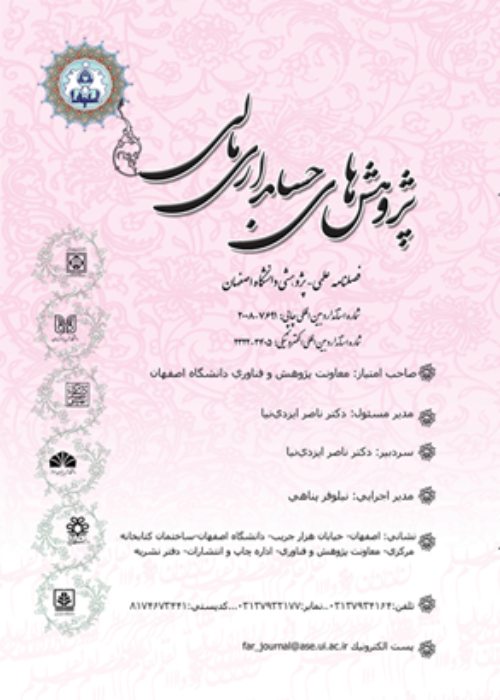The Effect of Intellectual Capital on Sustainability Performance Reporting and Business Strategy
Author(s):
Article Type:
Research/Original Article (دارای رتبه معتبر)
Abstract:
Intellectual capital as an intangible asset and also due to the possibility of continuous learning can be a stimulus for creating a competitive advantage for companies and as a result, more stability and a forward-looking view in earning profits, and paying attention to it may result in reducing the value gap and increasing the reliability of financial statements items. This study aims to investigate the effect of intellectual capital on sustainability performance reporting and business strategy of companies listed on the Tehran Stock Exchange. For this purpose, the data of 126 companies listed on the Tehran Stock Exchange in the period of 2013-2021 were collected and analyzed using multiple regression models. The results showed that the intellectual capital coefficient and its elements have a positive effect on companies’ sustainable performance reporting and also the intellectual capital coefficient and the efficiency of structural and physical capital have a positive effect on futuristic strategy while the efficiency of human capital has no effect on business strategy, Which in order to provide more information transparency, it is necessary to increase information and standardization of intellectual capital reporting in financial statements.IntroductionIntellectual capital as an intangible asset and also due to the possibility of continuous learning can be a stimulus for creating a competitive advantage for companies and as a result, more stability and a forward-looking view in earning profits, and paying attention to it may result in reducing the value gap and increasing the reliability of financial statements items. Business sustainability is a strategy that integrates social, economic, and environmental principles into the business model. Sustainable enterprises prioritize and apply environmental principles and socially responsible behavior in all business decisions and incorporate it into their business strategy. In a broader context, social, environmental, and economic demands are considered as three pillars of sustainable development. Business sustainability is not only desired for ethical and commercial reasons but also dictated by historical necessity. In the era of globalization and increasing competition, companies cannot underestimate the importance of social and environmental aspects, which should be equal in priority to financial aspects. Achieving economic, social, and environmental goals can bring many benefits and increase competitiveness. Considering that the institutionalization of intellectual capital and continuous innovation through it is considered a factor for creating a sustainable competitive advantage, the sustainable configuration of companies requires the configuration of intellectual capital to create sustainable added value. Today, the stability of companies depends on the use of a knowledge economy, and the prerequisite for the optimal use of a knowledge economy is the effective use of intellectual capital, and in general, it is necessary to create stability of performance to achieve sustainable competitive power, which according to previous researches, through the added value of intellectual capital can be realized. When talking about the role of knowledge in strategies, it means the knowledge of managers and employees of the organization. Employee knowledge can usually be a limiting factor in formulating organizational strategies, as some employees may not understand them. This is one of the biggest problems that managers face and it is the risk that employees do not understand organizational strategies. Developing a strategy is an activity that originates from the creativity of the human brain, and there is no written formula that gives the correct answer. On the other hand, intellectual capital as a knowledge-based approach has strengthened the interactions of individuals and groups in creating knowledge for the formulation and effective implementation of organizational strategy, the effective management of intellectual capital determines the structure, systems, and processes created by the company and the customer community in It is in line with interactive and competitive strategies inside and outside the organization. Considering the paradigm of a competitive force regarding the role of intellectual capital in gaining profitability and competitive power and the paradigm of the resource-based approach regarding the role of intellectual capital as a strategic asset, intellectual capital is considered one of the important drivers of organizational strategy and added value. Most intellectual capital will be associated with future-oriented and innovative strategy. This research aims to investigate the effect of intellectual capital on sustainability performance reporting and business strategy of companies listed on the Tehran Stock Exchange. Methods & MaterialThis research is a correlational research, and in terms of the purpose, the research is of an applied type, because the data of the listed companies in the past (historical) years were used; therefore, it is considered a type of post-event research. For this purpose, the data of 126 companies of the Tehran Stock Exchange in the period of 2013-2021 were selected and analyzed using multiple regression models. FindingThe result of test the first hypothesis of the research shows that the coefficient of added value of intellectual capital, and the efficiency of structural, physical, and human capital have a significant positive effect on the reporting of the commercial sustainability performance of the studied companies, and among the elements of intellectual capital, the efficiency of human capital It has the highest coefficient and effectiveness. The result of test the second hypothesis of the research showed that the coefficient of intellectual capital and its two elements, i.e. structural and physical capital efficiency, have a significant positive effect on business strategy, but human capital efficiency has no effect on business strategy. It requires the creation and standardization of intellectual capital reporting in financial reports. Conclusion & ResultsThe obtained result shows that the coefficient of intellectual capital and its elements turns knowledge into a sustainable competitive advantage and as a valuable intangible asset causes innovation in products and processes and creates an increasing quality that expresses the role of The knowledge-based economy in the changing environment and with today's advanced technology plays a role in gaining sustainable profits by acquiring new customers and innovations in the company's sustainability path and results in the creation of value and sustainable competitive advantage. Also, companies with a higher intellectual capital coefficient choose an aggressive strategy to rely on intellectual and knowledge-based abilities as a factor of superiority among competitors, to produce products with more innovations and a more differentiated quality compared to Provide competitors. Because this is the business strategy that can turn the company's intellectual capabilities and intangible capital into value, and in the meantime, intellectual capital as a source of value creation with the direction of a future-oriented strategy in earning sustainable profits. The motivation of the process of continuous improvement causes more efficiency in the use of the company's available resources. Considering that human capital, through structural capital and customer capital, turns knowledge into a sustainable competitive advantage, the need to pay attention to the structures and facilitate the business environment and training managerial and entrepreneurial skills seems necessary. Therefore, it is suggested to the policy-making and standard-setting institutions, in the direction of training to transform knowledge into a competitive advantage, to introduce procedures for registering and reporting intellectual capital as a competitive advantage, to reduce the gap between book value and market value, reliable financial reports should be provided for decision making. Also, to achieve the interests of all interested groups in society by influencing the environmental and social effects of companies, more emphasis is needed on the standardization of intellectual capital reporting as a stimulus for commercial sustainability. Investors are suggested to consider the coefficient of the added value of intellectual capital as a factor to strengthen sustainable performance and future-oriented strategy to achieve sustainable profit and also to choose stocks with a long-term perspective in earning profit. Investors are suggested to consider the added value factor of intellectual capital as an intangible asset that stimulates value creation in choosing their optimal portfolio. Corresponding author
Keywords:
Language:
Persian
Published:
Journal of Financial Accounting Research, Volume:14 Issue: 2, 2022
Pages:
63 to 90
magiran.com/p2547552
دانلود و مطالعه متن این مقاله با یکی از روشهای زیر امکان پذیر است:
اشتراک شخصی
با عضویت و پرداخت آنلاین حق اشتراک یکساله به مبلغ 1,390,000ريال میتوانید 70 عنوان مطلب دانلود کنید!
اشتراک سازمانی
به کتابخانه دانشگاه یا محل کار خود پیشنهاد کنید تا اشتراک سازمانی این پایگاه را برای دسترسی نامحدود همه کاربران به متن مطالب تهیه نمایند!
توجه!
- حق عضویت دریافتی صرف حمایت از نشریات عضو و نگهداری، تکمیل و توسعه مگیران میشود.
- پرداخت حق اشتراک و دانلود مقالات اجازه بازنشر آن در سایر رسانههای چاپی و دیجیتال را به کاربر نمیدهد.
In order to view content subscription is required
Personal subscription
Subscribe magiran.com for 70 € euros via PayPal and download 70 articles during a year.
Organization subscription
Please contact us to subscribe your university or library for unlimited access!




